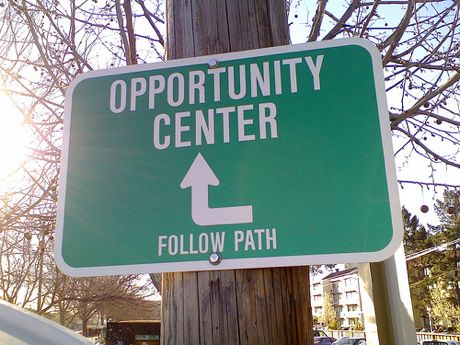Knocking Opportunity [or] How to make the best of free advice...
This is a time of unprecedented access to free support for your career and/or business (ED: think Chinwag's Careers Day this Weds).
Whether you’re a school-leaver or a graduate looking for a first job, an entrepreneur / freelancer starting out, or an employee looking to change direction, there is no shortage of individuals and organisations willing to meet, help and support you.
But what to do when you get that opportunity?
Based on a reasonably reliable mix of experience, observation and (occasionally hilarious) anecodotes from others here are a handful of things to help you make the most of the experience, and to leave a positive impression on those who might be helpful again later…
1 – Take the help! – Experienced individuals offer their help because they want to, and you’ll be surprised how open-minded and encouraging people can be. You (or your idea) don’t have to be fully formed as long as what you do present (and what you’d like to achieve) is thought through. And so…
2 – Prepare (pt. 1) – Whether it’s a mentoring slot at a co-working space, coffee with a senior manager at your organisation, a CV review at a careers event, or a meeting with that friend of a friend who has offered to read your look at your business plan / listen to your concept, make sure you’ve done everything you can to prepare beforehand – you’ll get more out of them and it will make it more engaging for both of you.
3 – Keep it relevant - This may seem obvious but it’s surprisingly easy to go off on a tangent, so focus on what you want to achieve from the meeting, write it down at the top of your notebook page under the word ‘Purpose’ and refer back to it during the meeting.
4 – Be realistic – There’s only so much that can be achieved in a 15/30/60 minute conversation, so think of one or two things you’d like to achieve or just ask to explore the situation you’re facing in a little more depth. It’s surprising how effective a short session can be if you go in to it knowing what you want and with your own expectations managed.
5 – Be responsible – Before you accept a meeting with someone make sure you really want / need it. If you don’t there will be others who will and rearranging someone experienced and influential at the last minute (or, worse, doing a no-show) is bad form.
If you do decide you no longer need it then say so (early). The person concerned will be glad you were up front and they may be more inclined to help again when you are ready.
6 – Consider their agenda – Your time may be costing you nothing but it may be costing them, and in reality no one really does anything for ‘free’. So whether they’re on the look out for the next big idea or they just get a buzz from helping people or sharing their knowledge bear in mind that they’re looking for ‘value’ too.
7 – Listen (pt. 1) – What you hear may be business gold or it may be something you already know (it’ll likely be somewhere in between). In any case, save your analysis of how effective the session is until afterwards.
Make notes, ask questions (prepare some beforehand) and, if you don’t understand something, say so (and keep saying so until you do). I don’t agree that there are ‘no stupid questions’ (I’ve asked loads) but better a stupid question than a missed opportunity…
8 – Ask for Feedback – You may have received all manner of comments during the session but the idea is to encourage the other person to synthesise all that into something really useful. Ask them to provide you with feedback on one or two things that you’re done well (good for confidence) and what you could do differently / better (this might hurt a bit!)
9 – Listen (pt. 2) – While the person you talk to may be more knowledgeable and experienced only you can know what is right for you. So, once you’ve listened to them, reflect on the meeting, ask yourself what’s relevant and then listen (to yourself). It’s amazing how much your gut can tell you once you learn how to listen to it.
10 – Prepare (pt. 2) – Finally, this may be one of many meetings you have in which to discuss your self / product / idea, so as soon as it’s done start preparing for the next one. Consider the feedback you’ve asked for and your reflections on the meeting. At the end of each coaching session I provide I always ask my clients (and myself), ‘What have you learned?’.
So, what have you learnt?
Photo (cc) Guerilla Futures / Jason Tester



